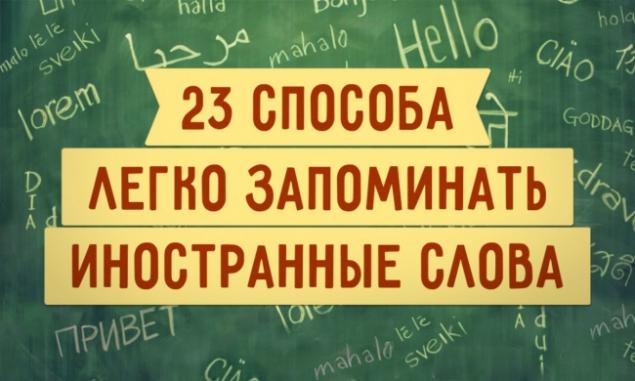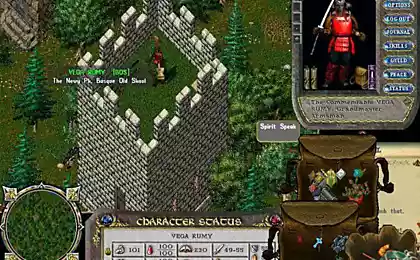
Learning a language is impossible without memorizing new words. But apart from the banal and boring rote learning there are many simple, and most importantly - effective ways to learn new words.
Website common c Eugenia Kashaeva publishes a helpful list of ways to memorize any foreign word.
First you need to deal with the fact how you best absorb information. To do this, there is a small but important checklist. If you - audial, the method of "reading a notebook" will work for you is far worse than the method of "listening to a list of words to text." And you can about it and do not even think about long and hard to the finish, and feeling of worthlessness look into this stupid book, and do not understand why nothing is remembered!
Traditional h3> Method Yartsev (visuals) Take a notebook. We write the column in 2-3 word - translation. We give a number of synonyms \ antonyms \ examples. From time to time we read the list, simply read nothing bison.
I do not know how it works, but, for example, I do not wonk German, but just time to read the notebook. The teacher did not suit dictations, never tested us lists. And I still, after many years, I remember a bunch of words.
It turns out that you do not strain, do not try to inject a 100 words in 30 minutes, just steadily, from time to time a refreshing material. But we must warn that these words should appear in textbooks, articles, ie you must, in addition to reading the notebooks, somehow activate them.
Method cards The second popular method. Take a bunch of cards and cut or buy square blocks of paper for notes. On one side write the word on the other - translation. For advanced users specify examples. Rides cards around, putting off those who know well. From time to time we repeat covered in order to refresh. Of the minuses - if a lot of words, but time is short, you spend a lot of time to create the cards themselves.
For entertainment, you can put them in piles of 10 pieces in different places apartments, from time to time they stumble, and repeat. Audialy to this method should definitely add pronunciation of loud. Cards come perfectly in children, it can be turned into an interesting game.
Method prescription Classics of the genre. You take a word and prescribe it many, many times. Excellent work for Chinese characters. Minus - melancholy green. But the way to test centuries.
Method "Half a page» This is one of my favorite ways. Gnesh sheet in half, with one side of the writing word on the reverse side - translation. You can quickly check yourself. For me as a visual works well because I'm easy to remember which part of the sheet was written the word. Minus - you get used to a particular word order.
Method "Interior designer» If you learn some specific vocabulary that surrounds you, you can always make a kind of «labels» - pasted stickers with the names of objects. You can also stick to the monitor nastiest words that do not want to remember. Plus this method is fun. Minus - the brain may begin to ignore all the papers, and then they will be a long time somewhere to hang out.
Optimization Techniques h3> The grouping method of grammatical attributes If you have a large list of words, the worst thing you can do with it - is to teach him haphazardly. It can and should be treated and grouped. For example, first you write a verb, and not write them in a row and are grouping by type of endings, or write out the masculine nouns, and then the women's individual exceptions, do not fall into these lists.
Thus, since most of the words we do not apply to exceptions, you begin to see the logic of language and memorize words in conjunction with the like.
The method of grouping within the meaning of you write and memorize the word and its synonym / antonym immediately. This is true for both beginners and intermediate. Here you learned the word 'good', find out as soon as is "bad." And if you were still remembered as "excellent, so so disgusting," then you're cool you enrich your vocabulary.
The method of studying single-root words We take the word, grouping them around the root, for example, "work / do / do," and learns several cognate parts of speech.
The etymological method works well for those who learned several languages. When you are engaged in several languages within the same linguistic branch, you start to see similar roots. This actually comes with experience, and removes the need once again learn a huge amount of words. At some point you just already know enough. And if I understand this word to me about anything not say categorically, I climb in an etymological dictionary and dig where it happened. Until I do, I memorize it.
Chains word You take a list of words that you need to learn, and combines them into a kind of story (even crazy). So you learn not 30 words and sentences 5 to 6 words each. If you come to this business creatively, can be fun and to spend time.
The methods for those who do not like his grandfather's methods h3> Spaced Repetition (spaced repetition) in the memory retention technique, consisting in the repetition of the academic content of a specific, ever-increasing intervals. In fact you are installing the application on your phone, and the program will automatically show you the words in a given order and with the desired frequency. You can use a ready list of words and create your own.
Pros: Comprehensive etched in my memory.
Cons: takes a very long time. If you have already memorized the word, it will still pop up from time to time in some programs.
The most popular program for this method - Anki.
Memrise.com In Memrayz you can choose ready-made word lists or create your own. If the word is strictly not memorized, you can use special amusing pictures that create users, using the techniques of mnemonics, or as a download. More Memrise recently added a new option - you can not just hear the words of the voice acting, but watch a video of how people pronounce the words.
Quizlet.com Here you can create your listings and generate different ways to check words (test, select the correct option, write spelling, etc.). A good way for fans of different tests to test themselves in a playful way.
Lang-8 Service to work on written language to have already mastered the basics of language practice. The user writes the text in the target language, and then taken for checking the written support of the language, and makes its own changes.
«Magic» Methods h3> Magical methods are very fond of different lure marketers and language guru. The method is usually in the "secret techniques of special services", which, objectively speaking, are described in a pile of literature. And ask for it nezdravye sums of money.
Mnemonics Mnemonics - one of the most popular ways, the essence of which - in inventing ridiculous and absurd associations to a word that does not work remember. You take the word and come up with some way associative, which should be very bright. But in this manner must be the "key" to memorize words.
Example: «grief» («Mountain") - Mount wounded tiger, vultures circling above him.
For audialov h3> Rule number one for you, always say out loud what you teach. If you use the card, blurts. If you read the list, read it aloud. Listen to the words for you this - the fastest way to remember them! Naturally, you will have to register them, but it will be faster than if you have read and wrote in silence.
Listen to the words You can put the record lists of words and repeat after the speaker. Usually, a good tutorial lesson is given to read a list of words. Also, you can listen to high-quality podcasts, which is a detailed analysis of the dialogues.
The site Forvo.com you can listen to the sound of each word as many times as you will need.
Multiple repeat method similar to the prescription of words in a row, quite tedious and boring, but effective - repeat out loud several times. There is an opinion that may be considered unlearned word, if you are 5 times used it in context. So try to lead five different examples of the use of the word. Naturally, out loud. Fix possible by writing it.
The methods for those who absolutely do not want to work with lists h3> Read (read many) If the level is high enough and there is no urgent need to urgently expand the vocabulary, the easiest way to read a lot. You can mark new words and even write them out (this works best, but not everyone likes to do it). By reading, you learn to understand the meaning from the context, you will "saturate" words, they themselves become your passive margin. But reading is not usually very helpful to translate them into an asset, ie, to progress in the language, in addition to reading to do something else.
Read and immediately form a list, you can use ReadLang.
Important Tricks for all h3> Teach words in context Do not teach my reason. Always learn the words in context, to select examples and phrases. Work with the dictionary.
Memorize the dialogue by heart Memorizing dialogues and small texts with a useful vocabulary by heart - one of the surest ways to what you think the right moment and the right to use the word in the desired context. Yes, it will take more time and effort, but in the long run in your head is a set of ready-made structures that you'll be happy to use.
Ask to have someone checked Take the husband / mother / child / friend and ask them to drive you to the list. Estimates of you, of course, will not put, but an element of control and discipline will be.
Learn what really needs In one of my books the word "hack" will meet in the lexicon before the appearance of the word "short and long". Do not teach "hoes" and all unnecessary garbage until, until you learn the really relevant and urgent language.
How to determine the relevance? There are many manuals and lists a series of "1,000 most frequent words." First, we learn the frequency, then - "hoes", not before. If you have not yet learned to read and do not know the pronoun you is still too early to learn colors as would be desirable.
creative approach to the process If you are all furious, the words do not climb to the head and want to quickly close these lists experiment. Someone help drawings, someone walks through the apartment, and recites aloud, someone talks to her cat. If you are interested in something, do not be lazy to go into the dictionary. Learn what you closely. Do not focus on techniques that do not work.
According to the materials: Petite Polyglot
via petitepolyglot.com/vocab/
























